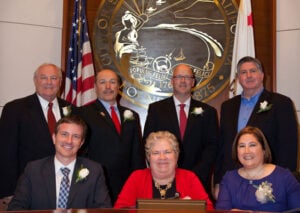CITY HALL — By the time the steadfast viewer of a Santa Monica City Council meeting has gotten to the items prefaced by the lucky number 13, they know they've made it to the home stretch.

That section, reserved for requests by City Council members, is often used to direct a small council discretionary fund toward pet projects, or take a stance on a national issue in which Santa Monicans have taken an interest.
Of late, 13 items, as they are known in local government parlance, have taken on a decidedly policy-driven tone, one that goes beyond whether or not the city by the sea should embrace genetically-modified salmon.
In March, councilmembers Kevin McKeown and Tony Vazquez requested that their colleagues consider "project labor agreements," a mechanism normally applied to public projects that could increase the number of Santa Monicans working on private construction in the city.
April saw spending on the Santa Monica College Spring Symposium and an official trip to Chicago, coupled with a push toward specific housing affordability requirements in the Bergamot Area Plan.
Later that month, councilmembers Ted Winterer, Gleam Davis and McKeown were requesting higher requirements for development agreements — contracts between City Hall and developers that allow them to exceed normal zoning codes — in terms of the number of carpooling employees while Winterer and Mayor Pro Tem Terry O'Day collaborated on a request to secure the greatest number of solar panels feasible on any given development.
The turn represents a shift in the way that the council, which acquired two new members in December, approaches development and what it wants out of developers, McKeown said Wednesday.
"Following an election that significantly shifted the council majority on some issues, I think what we're seeing is a new council dropping our oars in the water to change course," McKeown said.
Although unwilling to characterize the use of 13-items as "unique," City Manager Rod Gould noted that it is something of a departure from past practice, and gives staff more specific targets to hit during negotiations.
"Obviously there are more issues to be discussed with each developer that go beyond community benefits, and by virtue of these two items, we have council direction as to solar power requirements and (carpooling)," Gould said.
There has been some push back.
Before they got to requesting that city officials explore ways to prevent tenants from signing documents giving away specific rights in exchange for cash or other relocation benefits, Mayor Pam O'Connor had to interject.
"You realize that as we are adding these on, every few meetings, we are adding to the Christmas tree, so to speak," she said, referring to an analogy often used in development agreement conversations to suggest that community benefits like traffic management plans and solar cells are stuck onto private development at great cost and in large quantity.
Specific direction given at the dais, rather than through a comprehensive approach like the zoning code, could ultimately fell that tree, causing the development and all of the community benefit baubles to go with it.
Piecemeal planning can present problems in terms of stitching together concepts or policies that could be created seamlessly in one process, O'Connor said Friday.
"I have a little concern that if you throw another 13-item on, we're not looking at things in an interconnected fashion," O'Connor said.
In the case of carpooling, those policies are being addressed in a zoning code update that made its way before the Planning Commission on Wednesday, and the need for new building code across the board, not just for large development, has been acknowledged by city officials.
In the carpooling discussion, McKeown argued that the council needed to "up its game" on development agreements, particularly in cases where the request — asking more employees to share cars — might cost the developer relatively little.
Planning Commissioner Richard McKinnon, well known for his confrontational style with developers, sees the unorthodox methods used at both the City Council and Planning Commission level to push for higher environmental standards as a sign that some issues were going unaddressed.
He championed parking standards in March, forcing forward a community-wide series of discussions to clear the air after a debate over reduced parking requirements for new construction begun by a now-exiled consultant erupted into widespread anger amongst community members.
"It enables us to put things on the agenda that are of interest and value," McKinnon said. "It reflects an unmet need."
Whether or not that method creates policy wrinkles down the road has yet to be seen.
ashley@www.smdp.com








